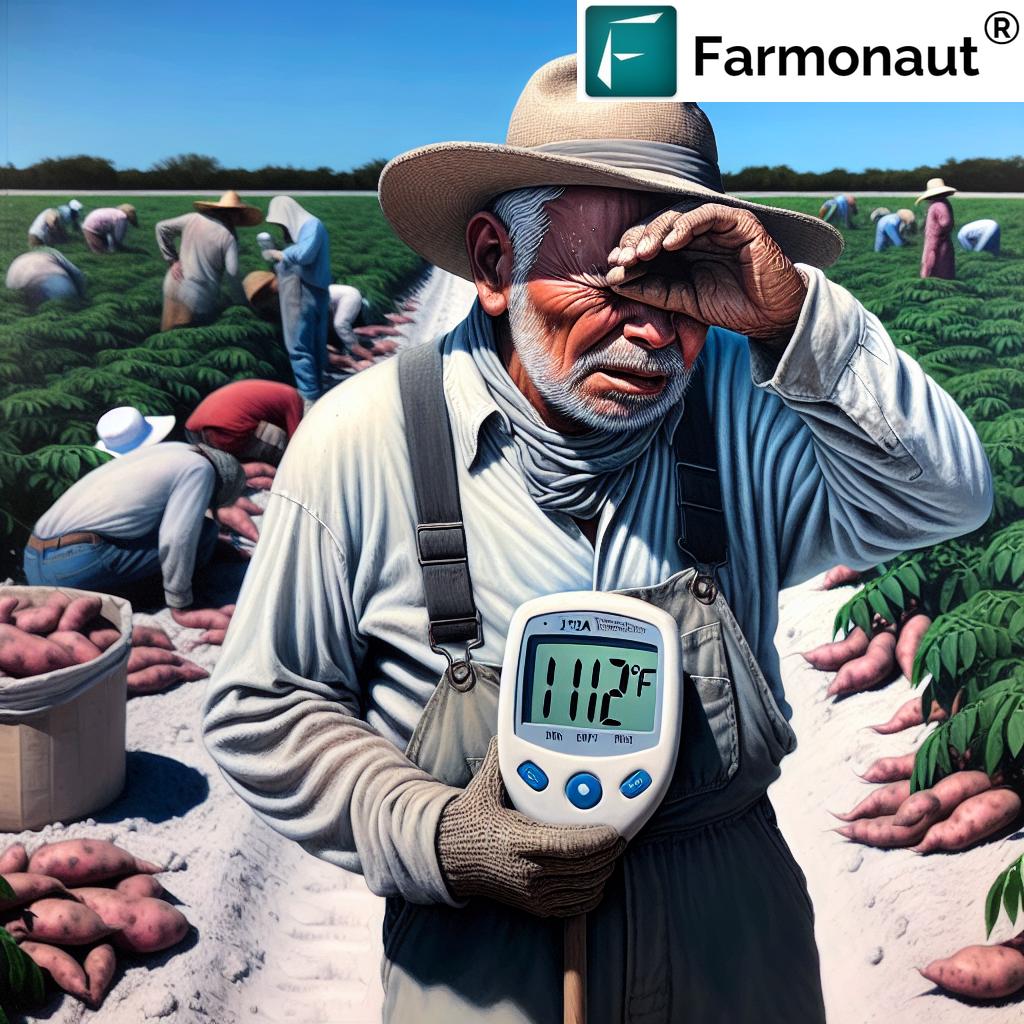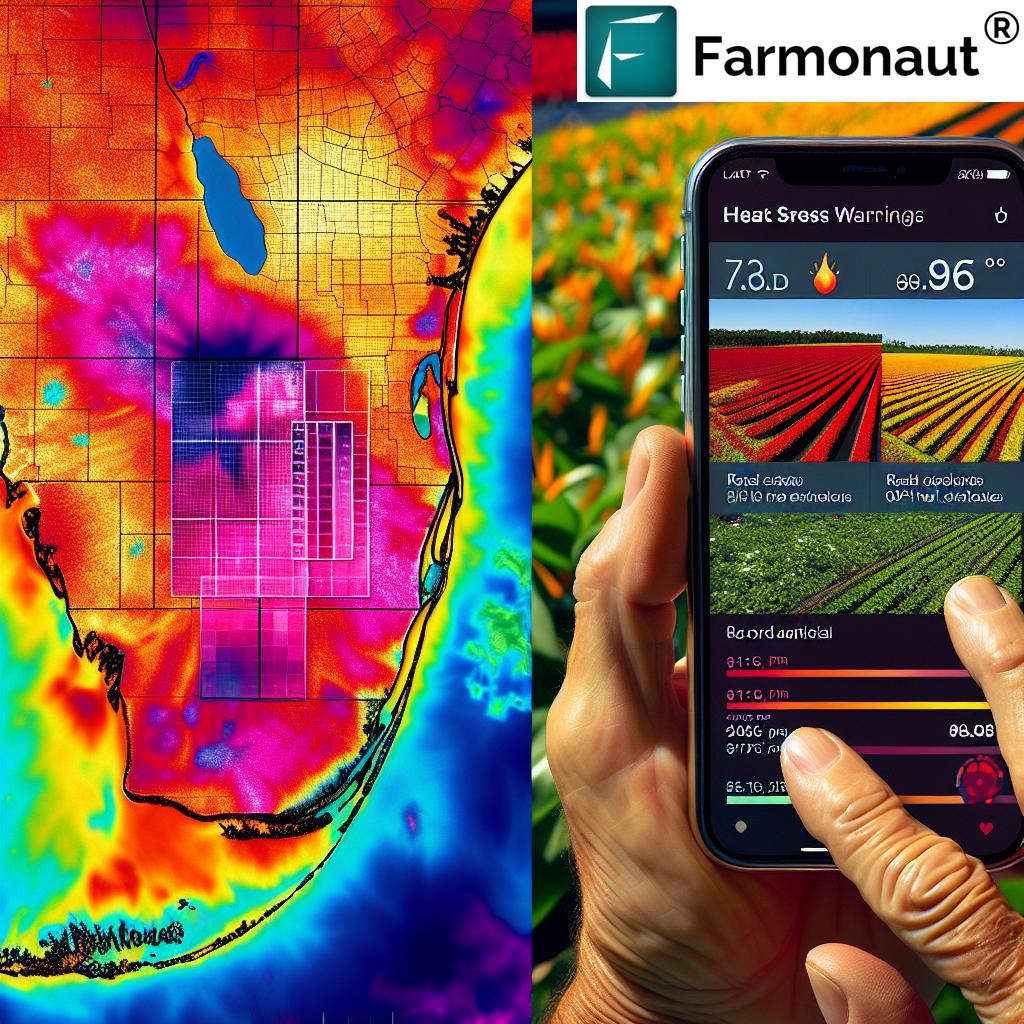Urgent: Florida’s Elderly Farmworkers Face Deadly Heat Crisis as Protection Laws Crumble

In the sweltering fields of Florida City, a crisis is unfolding that threatens the lives and livelihoods of some of America’s most vulnerable workers. Elderly agricultural laborers, like 75-year-old José Delgado, are facing unprecedented risks as they toil under increasingly extreme heat conditions, with little to no protection from the law.
The Human Cost of Florida Farmworker Heat Exposure
José Delgado’s story is a stark illustration of the dangers faced by farmworkers in Florida. Having suffered two heatstrokes in the past six years, Delgado continues to work in the fields despite his doctor’s warnings that another episode could be fatal. His experience highlights the urgent need for heat protection laws for outdoor workers in the state.
The extreme heat index in Florida has reached alarming levels:
- In 2023, Miami-Dade County experienced 63 days with heat advisories
- The heat index broke records in May, reaching 112°F
- For 46 consecutive days, the heat index exceeded 100°F during Florida’s hottest summer on record
These conditions pose severe farmworker health risks, particularly for elderly workers like Delgado.
The Struggle for Florida Farmworker Heat Protection
Despite the clear dangers, efforts to implement heat safety regulations for outdoor workers have faced significant obstacles. WeCount!, an immigrant and worker advocacy group, campaigned for a local law in Miami-Dade County that would require employers to provide water, rest, and shade breaks on excessively hot days.
However, the proposed protections never took effect due to:
- Opposition from agriculture and construction industry leaders
- Concerns about creating “an unneeded burden” for businesses
- Legislation signed by Governor Ron DeSantis banning cities and counties from imposing such protections
This setback has left workers like Delgado feeling abandoned and unprotected in the face of increasing heat dangers.

The Impact of Climate Change on Agricultural Labor
The crisis facing Florida’s farmworkers is a clear example of the climate change impact on agriculture. As temperatures continue to rise, the risks to outdoor workers are becoming increasingly severe. The Florida heat index record-breaking events of recent years are not isolated incidents but part of a broader trend that threatens the sustainability of agricultural labor.
For those interested in monitoring agricultural conditions and weather patterns, Farmonaut’s satellite-based agricultural monitoring app provides valuable insights:
Occupational Heat Illness: A Growing Concern
The lack of adequate protection has led to tragic consequences. In 2022 alone, at least three male farmworkers in Florida died from heat-related illnesses while working in various agricultural settings. These deaths underscore the urgent need for occupational heat illness prevention measures.
Key facts about heat-related fatalities among Florida farmworkers:
- A 28-year-old died while placing wooden stakes for bell peppers
- A 26-year-old collapsed while planting sugar cane
- A 41-year-old succumbed to heat while harvesting oranges
These incidents highlight the critical importance of implementing heat safety regulations for outdoor workers.
The Challenge of Elderly Agricultural Workers’ Health Risks
For elderly farmworkers like José Delgado, the risks are even more pronounced. With a lifetime of labor behind them and limited options for retirement, many continue to work well past the age when most Americans retire. The combination of advanced age and extreme heat creates a potentially lethal situation.
Challenges faced by elderly farmworkers include:
- Increased susceptibility to heat-related illnesses
- Cumulative effects of years of physical labor
- Limited access to healthcare and retirement benefits
For agricultural professionals looking to optimize crop management and monitor field conditions, Farmonaut’s API offers advanced satellite-based solutions.
The Fight for Migrant Worker Rights
The crisis facing Florida’s farmworkers is not just a matter of workplace safety; it’s a human rights issue. Many of these workers, like Delgado, are migrants who have spent decades contributing to America’s agricultural industry without the protections afforded to other workers.
Key issues surrounding migrant worker rights include:
- Lack of legal status preventing access to retirement benefits
- Vulnerability to exploitation due to immigration status
- Limited political power to advocate for better working conditions
For those interested in leveraging technology to improve agricultural practices and worker safety, Farmonaut’s API Developer Docs provide comprehensive guidance.
The Future of Agricultural Labor Regulations
While state-level protections have crumbled, there is hope on the horizon. The Biden administration has proposed federal regulations that would require employers to provide rest areas and water when the heat index reaches 80 degrees. These regulations could potentially protect about 35 million Americans working in outdoor and indoor heat-exposed environments.
However, the process of implementing such regulations is slow, and for workers like Delgado, time is of the essence. The extreme heat impact on farmworkers continues to grow more severe with each passing season.
A Call to Action
The crisis facing Florida’s elderly farmworkers demands immediate attention and action. As climate change continues to drive temperatures to new extremes, the need for comprehensive heat protection laws and outdoor worker safety measures has never been more urgent.
Steps that can be taken include:
- Advocating for the swift implementation of federal heat protection regulations
- Supporting organizations that provide assistance to farmworkers
- Raising awareness about the dangers faced by agricultural workers in extreme heat
For those in the agricultural sector looking to leverage technology for better crop management and worker safety, Farmonaut offers innovative solutions:
As we work towards a future where all workers are protected from the dangers of extreme heat, we must not forget the human stories behind the statistics. José Delgado and countless others like him continue to put their lives on the line to put food on our tables. It’s time for our laws and practices to reflect the value of their labor and the sanctity of their lives.
The crisis in Florida’s fields is a stark reminder of the urgent need for action on climate change, worker protection, and agricultural reform. As temperatures continue to rise, so too must our commitment to protecting those who work under the sun to feed our nation.


